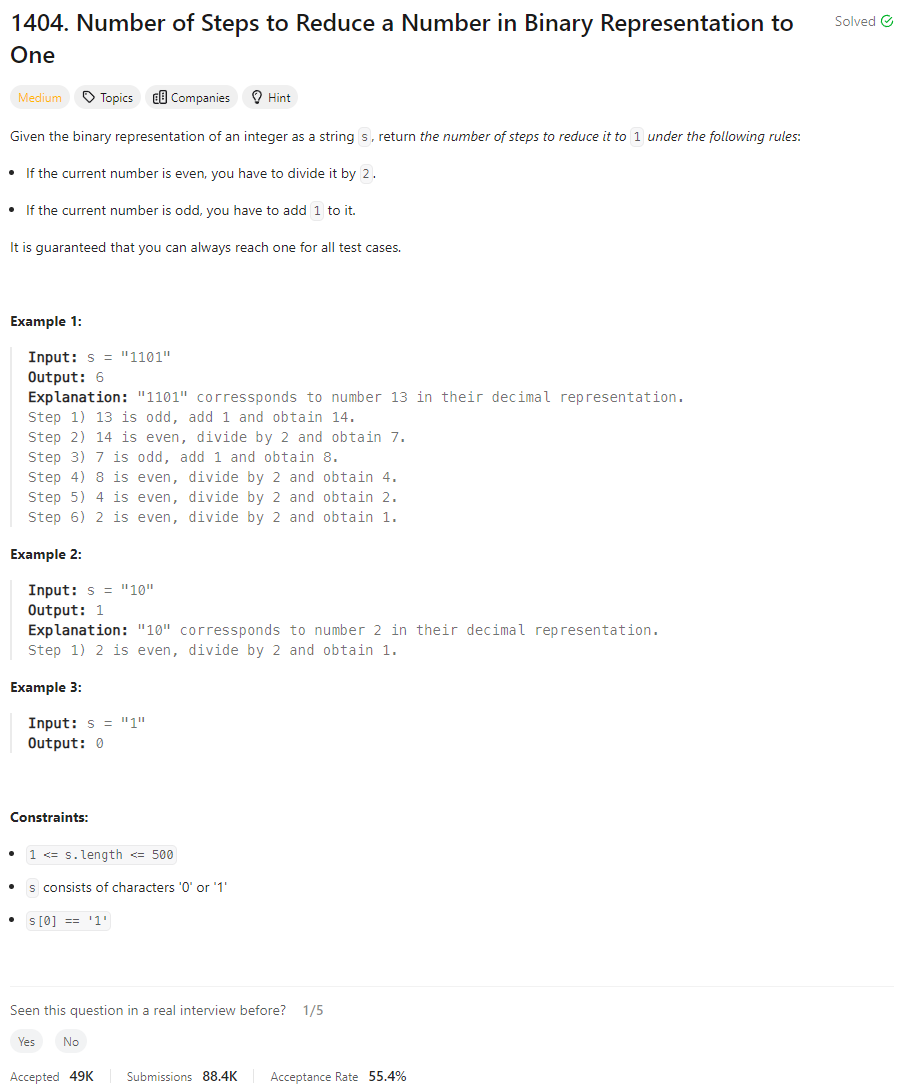Problem of The Day: Number of Steps to Reduce a Number in Binary Representation to One
Problem Statement

Intuition
My initial thought is to repeatedly apply the rules given: if the number is even, divide by 2; if it’s odd, add 1. The process continues until the number is reduced to ‘1’. Since binary representation simplifies division by 2 (just shifting right) and addition of 1 (handling carry), these operations can be efficiently managed.
Approach
- Convert the binary string to an integer.
- Initialize a counter for steps.
- Loop until the number is 1:
- If the number is even, divide it by 2.
- If the number is odd, add 1.
- Convert the result back to binary string for the next iteration.
- Increment the step counter each iteration.
- Return the total number of steps.
Complexity
-
Time complexity: The time complexity is (O(n)), where (n) is the number of bits in the binary string. Each operation (addition or division) reduces the number of bits, leading to a linear time complexity relative to the number of bits.
-
Space complexity: The space complexity is (O(1)) for the integer and step counter, not accounting for the space needed to store the binary string representation.
Code
class Solution:
def numSteps(self, s: str) -> int:
if s == '1':
return 0
steps = 0
while s != '0b1':
num = int(s, 2)
if num % 2 == 0:
num //= 2
else:
num += 1
s = str(bin(num))
steps += 1
return steps
I will improve this code by handling the binary string operations directly without converting back and forth between binary string and integer. This avoids unnecessary conversions and improves efficiency.
class Solution:
def numSteps(self, s: str) -> int:
steps = 0
while s != '1':
if s[-1] == '0':
s = s[:-1]
else:
s = bin(int(s, 2) + 1)[2:]
steps += 1
return steps
Editorial
Approach 1: Simulation
class Solution:
def divide_by_two(self, s):
s.pop()
def add_one(self, s):
i = len(s) - 1
# Iterating while the character is 1 and changing to 0
while i >= 0 and s[i] != "0":
s[i] = "0"
i -= 1
if i < 0:
s.insert(0, "1")
else:
s[i] = "1"
def numSteps(self, s: str) -> int:
s = list(s)
operations = 0
while len(s) > 1:
N = len(s)
if s[N - 1] == "0":
self.divide_by_two(s)
else:
self.add_one(s)
operations += 1
return operations
- Time: O(n^2)
- Space: O(N)
Approach 2: Greedy
class Solution:
def numSteps(self, s: str) -> int:
N = len(s)
operations = 0
carry = 0
for i in range(N - 1, 0, -1):
digit = int(s[i]) + carry
if digit % 2 == 1:
operations += 2
carry = 1
else:
operations += 1
return operations + carry
- Time: O(N)
- Space: O(1)